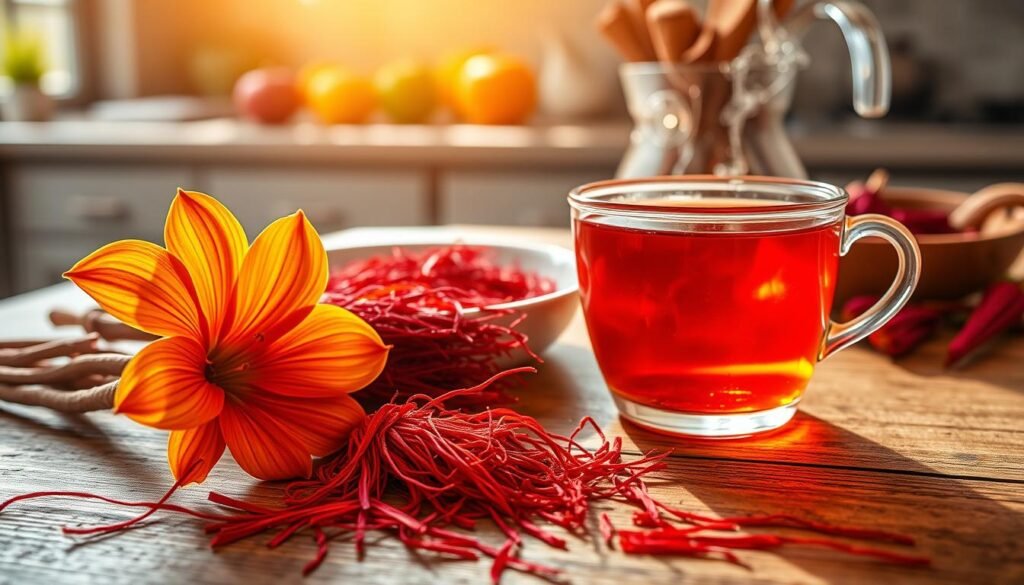Over 300 million people worldwide suffer from depression, often linked to anxiety. This highlights the urgent need for effective treatment options. Saffron has emerged as a potent saffron natural remedy for anxiety. It’s known for its calming effects on people’s worries and fears, thanks to its saffron anti-anxiety properties.
Saffron comes from the Crocus sativus flower and has a long history in traditional medicine. Studies show saffron supplements positively affect depression and anxiety symptoms compared to a placebo. Clinical trials have shown participants taking 20 mg to 400 mg of saffron daily experienced lower anxiety levels, better social interactions, and overall mental health improvement.
This article explores how saffron can be a useful tool for anyone facing anxiety challenges. We will look into its benefits, health advantages, and tips for adding it to your daily life. For more details on how saffron can help, check out this link on saffron.
Key Takeaways
- Saffron has shown potential as an effective natural remedy for anxiety.
- Extensive research supports saffron’s anti-anxiety and anti-depressive effects compared to placebo.
- Clinical trials have reported significant health improvements in participants using saffron.
- The typical dosage used in studies is around 30 mg per day for anxiety relief.
- Saffron’s application in everyday life can be accompanied by its culinary uses and supplements.
Introduction to Saffron as a Natural Remedy
Saffron comes from the flower Crocus sativus L. It’s known as the priciest spice around. Cultures over ages have used it to heal.
People value saffron for more than its flavor. It plays a big role in cooking and traditional healing. Now, many are checking out its health perks. They’re interested in its power to help with moods.
Taking 30 mg of saffron every day can help with depression. People often feel better in about one to two months. Saffron has compounds that boost brain health.
Saffron also has other benefits that enhance health. It’s a hit for those wanting natural treatment options. Many prefer it for its fewer side effects compared to drugs.
Understanding Anxiety and Its Effects on Mental Health
Anxiety is a common mental health issue worldwide. It brings a lot of worry and fear. This can greatly affect someone’s daily life and happiness.
People with anxiety often feel physical signs like rapid heartbeat, sweating, and tight muscles. These signs can make the worry and fear worse. Emotional symptoms such as feeling on edge, being restless, and having trouble focusing can reduce someone’s quality of life. It makes it hard to get things done or have good times with others.
It’s very important to treat anxiety. Most treatment plans involve therapy and medication. Yet, many people are also looking at natural ways to feel better. Research is looking into options like saffron for its saffron uses for stress. This could help as part of a full treatment plan. By checking out these options, people might find relief that matches their way of life and health goals.
What is Saffron?
Saffron comes from the Crocus sativus flower, mainly found in Iran. It’s a yellow-orange spice known for its unique taste and smell. People have used it in culture and medicine for a long time. Because it takes about 1,000 flowers to get just 5 grams of saffron, it’s the most expensive spice in the world.
Saffron is more than just a spice for cooking. It has been used in traditional medicine to help with many health issues, like mood problems and anxiety. It’s not just for making food taste better; it also supports overall well-being.
Even though saffron is costly, selling for $10 or more per gram, its special qualities make it sought after in various fields. Scientists are now studying it more, especially for its potential to ease anxiety and depression. Clinical studies back up its benefits, showing saffron’s great promise for both food and health sectors.
Potential Health Benefits of Saffron
Saffron has been used for about 4,000 years as a natural healer. Recent studies showed its numerous benefits for mood and emotional health. It contains antioxidants like crocin, picrocrocin, and safranal which are key for good health.
Daily intake of 30 mg of saffron can help with mild-to-moderate depression. This is similar to effects from drugs like imipramine and fluoxetine. Women aged 20 to 45 saw their PMS symptoms decrease by taking saffron. Also, smelling saffron can reduce stress by lowering cortisol levels.
For men, saffron can improve erectile dysfunction and boost sex drive. It helps keep semen healthy too. Studies also show saffron can lower body mass index (BMI), reduce total fat, and trim waist size in heart disease patients.
Saffron might help improve brain function in Alzheimer’s patients over 22 weeks, similar to the drug donepezil. Its antioxidants could also guard against brain conditions and better cognitive function.

Taking up to 1.5 grams of saffron daily is safe, but more can be toxic. Pregnant women should stay below 5 grams to avoid risks. Always talk to a doctor before adding saffron to your diet to prevent allergies or side effects.
Saffron for Anxiety: A Scientific Perspective
Saffron comes from the Crocus sativus flower and is famous for possibly reducing anxiety. Studies show its value in both old traditions and current science. The research points out how saffron helps improve mental well-being.
Studies Supporting Saffron’s Anti-Anxiety Properties
Research has tested how saffron influences anxiety with positive outcomes. In these tests, people taking saffron felt less anxious than those who didn’t. This suggests saffron could be a natural way to manage anxiety, avoiding the downsides of usual medications.
Compounds Found in Saffron Relevant to Mental Health
There are about 150 substances in saffron, but crocin and safranal are especially important for the brain. Crocin shows quick benefits, helping explain saffron’s effect on anxiety. These substances interact with brain signals, possibly helping control emotions.
How Saffron Lowers Anxiety Levels
Saffron is becoming a popular choice for those looking for natural remedies for anxiety. It has special compounds that affect the brain in many ways. This makes it a comprehensive tool for easing anxiety. Its key components, like crocin and safranal, influence mood by changing brain chemicals.
Studies show that crocin limits the absorption of dopamine and norepinephrine. Safranal, on the other hand, affects serotonin. This combination makes saffron effective against the chemical imbalances linked to anxiety. Trials with Generalized Anxiety Disorder (GAD) patients reveal that saffron can boost the effect of standard treatments. It’s a hopeful option for those who don’t fully benefit from usual therapies.
Research has proven saffron’s ability to decrease anxiety levels. It works according to measures like the Hamilton Anxiety Rating Scale. Those who took saffron felt less stressed and showed lower cortisol levels. This suggests saffron is a potent anxiety treatment method.
There’s a growing interest in using natural treatments for mental health. Saffron’s healing properties are becoming more recognized in this field. As anxiety treatment methods advance, knowing how saffron can help is crucial. While more research is needed, especially for younger people, the initial results are hopeful. For more details on using saffron, click here.
Recommended Dosage of Saffron for Anxiety Relief
Choosing the right dose of saffron for easing anxiety is important for both safety and results. Studies show taking 20 to 400 mg of saffron each day helps with anxiety symptoms. A common dose found effective is about 30 mg daily.
Talking to health experts before starting supplements is wise. This ensures the dose is right for your unique health needs.
Here is a comparative look at recommended dosages based on various studies:
| Study | Dosage | Duration | Effect Observed |
|---|---|---|---|
| RCT on Major Depressive Disorder | 30 mg daily | 6 weeks | Reduced anxiety and depression |
| Double-Blind RCT | 50 mg daily | 12 weeks | Significant depression reduction |
| Crocin RCT | 30 mg daily | 4 weeks | Improvement in depression scores |
| Comparative Study | 15 mg twice daily | 8 weeks | Equal efficacy to fluoxetine |
Research shows saffron is effective for anxiety relief within a certain dosage range. Always work with a healthcare provider to find the best treatment for you.
Ways to Incorporate Saffron Into Your Diet
Saffron is a special spice with a bright color and a unique taste. It can improve many dishes. Besides making food taste better, saffron can also help with anxiety. Adding this herb to your daily meals or taking it as a supplement can reduce stress and improve your mood.
Culinary Uses of Saffron
Saffron is great in many different recipes. It adds flavor and a beautiful color. Here are a few ways to use saffron in your meals:
- Risottos: It gives creamy risottos a rich taste.
- Soups: It adds a subtle flavor to broths and cream soups.
- Teas: Mixed with other herbs, it makes a calming tea.
- Sweets: It brings an exotic touch to cakes, pastries, and ice cream.
Using saffron in the kitchen can turn regular meals into something special. It can also help you feel more relaxed.
Saffron Supplements for Anxiety Relief
For a more focused effect, saffron supplements are an option. They come in capsules or powder. These supplements provide a set dose that helps with mood and anxiety. Studies show saffron extract is effective against anxiety. It is often recommended to take 15 to 30 milligrams each day.
| Supplement Type | Typical Dosage | Benefits |
|---|---|---|
| Saffron Capsules | 15-30 mg/day | A convenient way to support mood and alleviate anxiety symptoms. |
| Saffron Powder | 15-30 mg/day | Good for cooking, it brings the benefits right to your meals. |
Whether in your cooking or as a supplement, saffron is an easy way to fight anxiety. It’s a unique spice that offers more than just taste.

Potential Side Effects of Saffron Consumption
Saffron is known for its health benefits. However, it’s important to be aware of its potential side effects. Some people may experience nausea, drowsiness, and changes in hunger. Knowing these effects is key, particularly when thinking about saffron for anxiety and depression.
Clinical studies and stories from people show side effects are rare and usually minor. Saffron is considered safe to use. This is good news for those looking for natural options instead of standard medicines, which often have tougher side effects.
But, certain groups need to be careful. Pregnant or nursing people should talk to doctors before using saffron. This is because there’s not much info on its safety for them. Safety first means ensuring the benefits, like anxiety reduction, are worth it.
Knowing the pros and cons of saffron helps in making smart choices for anxiety management. It’s crucial to listen to your body to get the best health results.
Who Should Consider Saffron for Anxiety Management?
Saffron might be a good natural option for people dealing with light or moderate anxiety. It’s famous for its compounds, crocin and safranal. These impact the brain’s mood pathways. Yet, evidence on saffron’s effect on anxiety is still emerging and should be looked at with care.
Those who may find saffron helpful include:
- Those with subclinical levels of anxiety or mood-related issues.
- People seeking complementary approaches alongside therapies like psychotherapy.
- Individuals looking for natural flavors to enhance meals while potentially gaining mental health benefits.
However, if you have health conditions or take other medicines, talk to a doctor before trying saffron. It can have side effects, like worsening anxiety for some. Pregnant or nursing women should also get medical advice, due to the lack of safety data.
Studies show saffron can significantly improve mood and reduce anxiety symptoms more than a placebo. Still, it’s important to discuss with health care providers about all treatment options. Especially if your anxiety feels too much. For more details on saffron and anxiety, check this source.

Knowing the potential benefits and risks of saffron can help you decide if it fits your anxiety management plan.
Key Takeaways on Using Saffron for Anxiety
Exploring saffron’s use for anxiety is promising for those seeking natural remedies. It’s known for significant saffron anti-anxiety properties. Studies show it can reduce anxiety symptoms as well as traditional antidepressants can. For example, one clinical trial found that 63% of participants using saffron saw their anxiety symptoms greatly reduce.
The compounds in saffron, like crocin and safranal, are key to its effects. They help protect the brain which means saffron could help with anxiety and overall brain health. People usually notice improvements after using saffron consistently for four to six weeks.
Getting high-quality saffron is necessary for it to work. Look for reputable sellers and talk to a doctor before starting any new treatment. Adding saffron to your life in a careful way can boost your mental health.
- It can lower anxiety symptoms like many prescription medicines do.
- Its neuroprotective traits could improve your mental health.
- It may have fewer side effects than some antidepressants.
- It can be a cost-effective treatment every month.
For more on how saffron helps with anxiety, check out saffron for anxiety.
| Research Aspect | Findings |
|---|---|
| Saffron in Clinical Trials | 63% of participants achieved remission, with minimal side effects reported. |
| Active Compounds | Crocin and safranal contribute to neuroprotection and overall mood enhancement. |
| Dosage Consideration | Daily doses of approximately 30 mg are effective, based on clinical studies. |
| Effects Over Time | Noticeable improvements typically seen within 4 to 6 weeks of regular use. |
Using saffron in your daily routine may help balance your emotions, making every day better.
Conclusion
Saffron is gaining attention as a natural anxiety remedy. Its use dates back to ancient times as a soothing herb. Today, research supports saffron’s effectiveness in easing anxiety. It works as well as some common drugs but with fewer side effects. This makes it a great choice for those looking for natural mental health support.
Also, saffron boosts overall mental well-being. It not only works with other treatments to lift depression but also fights oxidative stress. These benefits show why more people consider saffron for a healthier mind.
Using saffron for anxiety might be a key step in improving mental health. For many, adding it to their daily routine offers a gentle, calming effect. It becomes a powerful aid for anyone seeking peace of mind and relief from anxiety.